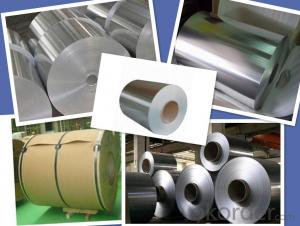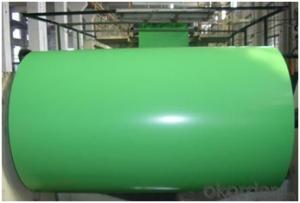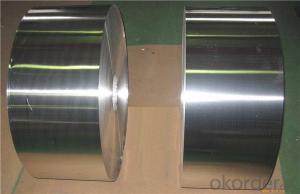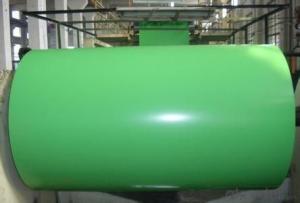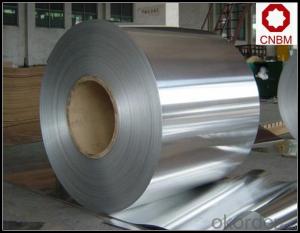Aluminum coil for competitive price from China
- Loading Port:
- Tianjin
- Payment Terms:
- TT OR LC
- Min Order Qty:
- 3 m.t.
- Supply Capability:
- 1000 m.t./month
OKorder Service Pledge
OKorder Financial Service
You Might Also Like
Item specifice
1. Specification of aLLOY 1050
1) Alloy | 1050, 1060,1100, 3003 3004 3105 3A21 5005 5052 etc |
2) Temper | O/H12/H14/H1/H18/H32/H34/H36/H38//H111/H112/H116/H321/T6/T651/T3/T351 etc |
3) Thickness | 0.1mm to 6mm |
4) Width | 20mm to 3300mm |
5) Coil weight | 100kgs to 6 tons depends on actual requirement |
6) Core material | Aluminum or paper |
7) Coil Inner diameter | 75mm, 150mm, 200mm, 300mm, 405mm, 505mm or as required |
8) Protective film can be added
2. Application of ALLOY 1050
(1).Interior: wall cladding, ceilings, bathrooms, kitchens and balconies, shutters, doors...
(2).Exterior: wall cladding, facades, roofing, canopies, tunnels,column covers , renovations...
(3).Advertisement: display platforms, signboards, fascia, shop fronts...
3. Feature of alloy 1050
*Such coil is specially designed to replace aluminum ingot, due to the high export tax of aluminum ingot, the coil has better price than ingot.
*This type of coil can fit customer's remelting furnace just like ingot, no need to make any change to the production line that was previously used for ingot. The standard coil size and weight is very suitable for the feed gate of furnace.
*This type of coil causes less material wastage than ingot when remelted.
*Our coil is made directly from ore, no need to go though the ingot making process, quality is much better than other suppliers who use ingot scrap to make coil.
Be free from Oil Stain, Dent, Inclusion, Scratches, Stain, Oxide Dicoloration, Breaks, Corrosion, Roll Marks, Dirt Streaks and other defect which will interfere with use
4. Certificate:
SGS and ROHS(if client request, paid by client), MTC(plant provided), Certificate of Origin(FORM A, FORM E, CO), Bureau Veritas and SGS (if client request, paid by client), CIQS certificate
5. Image of alloy 1050
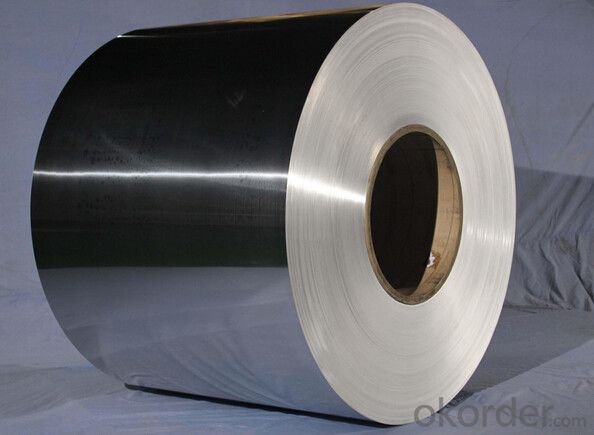
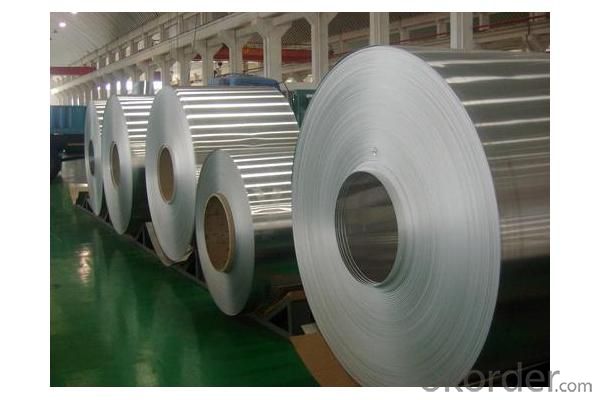
6. Package and shipping of alloy 1050
eye to wall
eye to the wall
with wood pallet (wooded case also available)
7. FAQ
1) What is the delivery time?
Dpends on actual order, around 20 to 35 days
2)What is the QC system:
We have QC staff of 20 persons and advanced equipment, each production is with MTC traced from Aluminum ingot lot.
3) What market do you mainly sell to?
Australia, America, Asia, Middle East, Western Europe, Africa etc
- Q:How do aluminum coils contribute to the corrosion resistance of marine applications?
- The corrosion resistance of marine applications is greatly improved by aluminum coils, thanks to the unique properties and characteristics of aluminum as a material. To begin with, aluminum naturally forms an oxide layer on its surface when it comes into contact with air. This oxide layer is highly resistant to corrosion and acts as a protective barrier to prevent further oxidation and corrosion of the metal. This inherent property of aluminum makes it an excellent choice for marine applications, where constant exposure to saltwater and moisture can be extremely corrosive. In addition, aluminum coils can be alloyed with elements like magnesium and manganese to further enhance their corrosion resistance. These alloying elements not only strengthen the aluminum but also improve its resistance to pitting and crevice corrosion. Pitting corrosion occurs when localized damage exposes the underlying metal, while crevice corrosion occurs in areas with restricted oxygen flow, such as gaps or joints. By alloying aluminum, the coils become more resistant to these types of corrosion, making them highly suitable for marine environments. Furthermore, aluminum coils can be coated with protective finishes such as anodizing or painting, which provide an extra layer of defense against corrosion. Anodizing involves creating a thicker and more durable oxide layer on the aluminum surface, thereby increasing its resistance to corrosion. On the other hand, painting acts as a physical barrier that shields the coils from direct contact with corrosive elements present in the marine environment. In conclusion, aluminum coils contribute to the corrosion resistance of marine applications through the presence of a natural oxide layer, alloying with other elements, and the option of protective finishes. These characteristics ensure that aluminum coils are highly durable and capable of withstanding the challenging conditions encountered in marine environments, guaranteeing their longevity and reliability.
- Q:What is color aluminum coil?
- The base plates are all aluminum, but the surface has been colored.
- Q:How are aluminum coils used in the production of automotive parts?
- Aluminum coils play a crucial role in the production of automotive parts. Due to their lightweight and corrosion-resistant properties, aluminum coils are extensively used in the manufacturing of various automotive components. One of the main applications of aluminum coils in the automotive industry is in the production of body panels. These coils are processed into sheets, which are then formed and shaped into body panels such as hoods, doors, fenders, and roofs. The lightweight nature of aluminum helps to reduce the overall weight of the vehicle, resulting in improved fuel efficiency and better handling. Aluminum coils are also used in the production of heat exchangers for automotive air conditioning systems and radiators. The excellent thermal conductivity of aluminum allows for efficient heat transfer, ensuring optimal cooling performance. This helps to maintain the desired temperature in the vehicle's interior and prevent engine overheating. Additionally, aluminum coils are utilized in the production of various engine components. They are widely used in the manufacturing of cylinder heads, engine blocks, and intake manifolds. The high strength-to-weight ratio of aluminum makes it an ideal material for these applications, as it provides strength and durability while reducing the overall weight of the engine. Moreover, aluminum coils are used in the production of suspension components such as control arms and subframes. The lightweight nature of aluminum allows for better suspension performance, resulting in improved handling and a smoother ride. In summary, aluminum coils are extensively used in the production of automotive parts due to their lightweight, corrosion-resistant, and high-strength properties. They are employed in the manufacturing of body panels, heat exchangers, engine components, and suspension parts, contributing to the overall performance, efficiency, and durability of vehicles.
- Q:How are aluminum coils used in packaging?
- Aluminum coils are commonly used in packaging as they can be easily molded into different shapes and sizes. They are used to create various packaging products such as cans, containers, and foils. The coils are converted into sheets or strips, which are then formed into the desired packaging structures through processes like rolling, cutting, and shaping. The lightweight and corrosion-resistant nature of aluminum make it an ideal choice for packaging applications, ensuring the protection and preservation of various products.
- Q:Hey everybody I'm trying to improve the performance of my vintage metal Coleman cooler I just got. To test it I filled it up with water bottles and 5lbs of cubed ice from Stop and Shop and left it in the closet with the dorm's AC set to 65. When I got back 28 hours later the ice was completely melted. The water still kept the drinks cool for several days after that, but I'm frustrated that the ice melted in a single day.
- It's perfect if you are just starting out or if you're a seasoned carpenter. you will like it for sure ! It has almost 20.000 woodworking plans and you have a CAD/DWG software to view and edit the plans. You have step-by-step instructions with photos and high quality blueprints and schematics. If you are a beginner this is the easiest way to start your woodworking projects, and if you already have experience you can anyway find a lot of interesting ideas!
- Q:What are the common maintenance practices for aluminum coils?
- Some common maintenance practices for aluminum coils include regular cleaning, inspection for damage or corrosion, and ensuring proper airflow around the coils. Cleaning the coils is important to remove dirt, debris, and other contaminants that can accumulate over time. This can be done by gently brushing or vacuuming the coils, or using a mild detergent and water solution to clean more stubborn dirt. It is important to avoid using harsh chemicals or abrasive materials, as they can damage the aluminum surface. Inspecting the coils for damage or corrosion is also essential for maintaining their performance and longevity. Any signs of physical damage, such as dents or bends, should be addressed promptly to prevent further deterioration. Additionally, corrosion can occur due to exposure to moisture or chemicals, so it is important to check for any signs of rust or discoloration. If corrosion is present, it should be treated and the cause of the corrosion should be addressed to prevent future damage. Proper airflow around the coils is crucial for efficient operation. Obstructions or blockages in the surrounding area should be cleared to ensure adequate air circulation. This can include removing any debris or objects that may be restricting airflow, as well as ensuring proper spacing between the coils and nearby objects. Additionally, regular inspection of the air filters and ventilation system is important to prevent any restrictions that could impact airflow. Overall, regular cleaning, inspection, and maintenance of aluminum coils can help ensure their optimal performance and prolong their lifespan. It is recommended to follow manufacturer guidelines and consult with professionals if any issues or concerns arise.
- Q:What are the storage life and shelf life of aluminum coils?
- The storage life and shelf life of aluminum coils can vary depending on various factors such as the storage conditions and the specific type of aluminum alloy used. Generally, aluminum coils have a relatively long storage life and shelf life. In terms of storage life, aluminum coils can be stored for an extended period of time without significant degradation in their quality or performance. However, it is important to store them in a dry and well-ventilated area to prevent corrosion. Moisture can cause oxidation and corrosion, which can affect the integrity and durability of the aluminum coils. As for the shelf life, aluminum coils can remain in good condition and retain their functional properties for an extended period of time when stored properly. The exact shelf life will depend on the specific application and the intended use of the aluminum coils. To ensure the longevity of aluminum coils, it is recommended to follow the manufacturer's guidelines for storage and handling. Additionally, regular inspections and maintenance can help identify any signs of corrosion or damage and take appropriate measures to prevent further deterioration.
- Q:What is the role of aluminum coils in the automotive industry?
- Aluminum coils have a significant impact on the automotive industry, specifically in vehicle manufacturing. These coils are utilized to produce various parts and components like radiators, condensers, and air conditioning systems. One of the primary reasons why aluminum coils are favored in the automotive industry is due to their lightweight properties. Aluminum is considerably lighter compared to other metals like steel, making it an excellent option for enhancing fuel efficiency and reducing the overall weight of vehicles. Consequently, this not only improves vehicle performance but also decreases emissions, thereby contributing to a more environmentally friendly transportation sector. Moreover, aluminum coils possess exceptional thermal conductivity, which is crucial in automotive applications. They efficiently dissipate heat, ensuring the proper functionality of cooling systems and preventing overheating. This is particularly important for components such as radiators, as effective heat transfer is essential for maintaining an optimal engine temperature. Furthermore, aluminum coils exhibit high corrosion resistance. They naturally develop an oxide layer that safeguards against rust and corrosion, rendering them more durable and long-lasting compared to other metals. This corrosion resistance is particularly vital in the automotive industry, where vehicles are exposed to various environmental factors such as moisture, salt, and chemicals. Additionally, aluminum coils offer design flexibility. They can be easily molded and shaped into different sizes and configurations, enabling manufacturers to produce complex and customized components. This design flexibility allows automotive companies to optimize space and maximize efficiency in their vehicles. To summarize, aluminum coils play a crucial role in the automotive industry. Their lightweight nature, excellent thermal conductivity, corrosion resistance, and design flexibility make them an ideal choice for various automotive applications. Consequently, they contribute to improved vehicle performance, fuel efficiency, and overall durability.
- Q:What maintenance is required for aluminum coils?
- Regular maintenance for aluminum coils includes cleaning, inspecting for damage or corrosion, and ensuring proper airflow around the coils. Additionally, it is important to check the refrigerant levels and ensure that the coils are not blocked by dirt or debris.
- Q:Are aluminum coils suitable for pharmaceutical packaging?
- Yes, aluminum coils are suitable for pharmaceutical packaging. Aluminum is a widely used material in the pharmaceutical industry due to its excellent barrier properties, durability, and flexibility. It provides effective protection against moisture, light, oxygen, and other external factors that can degrade the quality and stability of pharmaceutical products. Aluminum coils can be easily formed into various shapes and sizes, making them ideal for packaging different types of pharmaceutical products such as tablets, capsules, and ampoules. The ability to customize the packaging according to specific requirements ensures that the products are properly sealed and protected during storage and transportation. Furthermore, aluminum is non-toxic and chemically inert, meaning it does not react with the contents of the packaging. This is crucial for pharmaceutical products as it ensures the integrity and safety of the medication. Aluminum coils also have excellent heat conductivity, making them suitable for heat-sealing processes commonly used in pharmaceutical packaging. In addition to its functional properties, aluminum is a sustainable and environmentally friendly choice for pharmaceutical packaging. It is easily recyclable, reducing the environmental impact and promoting sustainability in the healthcare industry. Overall, aluminum coils are highly suitable for pharmaceutical packaging due to their barrier properties, flexibility, customization options, non-reactivity, heat conductivity, and sustainability.
1. Manufacturer Overview |
|
|---|---|
| Location | |
| Year Established | |
| Annual Output Value | |
| Main Markets | |
| Company Certifications | |
2. Manufacturer Certificates |
|
|---|---|
| a) Certification Name | |
| Range | |
| Reference | |
| Validity Period | |
3. Manufacturer Capability |
|
|---|---|
| a)Trade Capacity | |
| Nearest Port | |
| Export Percentage | |
| No.of Employees in Trade Department | |
| Language Spoken: | |
| b)Factory Information | |
| Factory Size: | |
| No. of Production Lines | |
| Contract Manufacturing | |
| Product Price Range | |
Send your message to us
Aluminum coil for competitive price from China
- Loading Port:
- Tianjin
- Payment Terms:
- TT OR LC
- Min Order Qty:
- 3 m.t.
- Supply Capability:
- 1000 m.t./month
OKorder Service Pledge
OKorder Financial Service
Similar products
New products
Hot products
Hot Searches
Related keywords
